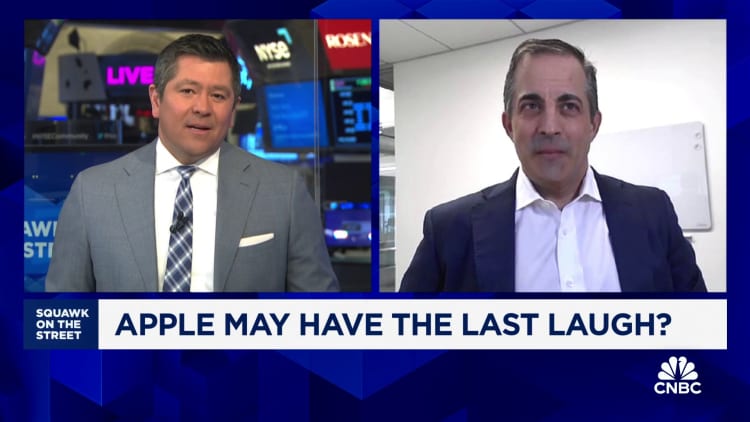
SHANGHAI, CHINA – MARCH 21: Tim Cook, chief executive officer of Apple Inc., arrives for opening ceremony of the new Apple Jing’an store on March 21, 2024 in Shanghai, China. The new Apple store opens on March 21 in Shanghai’s Jing’an district. (Photo by VCG/VCG via Getty Images)
Vcg | Visual China Group | Getty Images
Apple could double down on the China smartphone market amid declining iPhone sales and stiff competition in the country, Wedbush Securities said on Monday.
Apple needs to overcome its China challenges including a tough macro environment and competition from Huawei before the iPhone 16 release and “it all starts with reaffirming Apple’s presence in China,” Wedbush said.
China’s Minister of Commerce Wang Wentao met Apple CEO Tim Cook on Friday and said his country holds opportunities for Apple as well as other companies, and asked the iPhone maker to keep building its business in China for “shared development,” according to a press statement.
Cook said China was a crucial supply chain partner for Apple and the company plans to increase investment in the country in the long term, the statement said.
Last week, Cook opened Apple’s newest flagship store in Shanghai on Thursday and met with key suppliers in China, according to media reports. He also attended the China Development Forum in Beijing, as China seeks to woo foreign investors amid regulatory and global uncertainties.
Cook’s latest trip to China, which Wedbush said is “a sign Apple could double down” on China, comes amid reports of iPhone sales in China plunging 24% in the first six weeks of 2024.
Apple is operating in a challenging environment in its largest overseas market, China, as it faces stiff competition from local Chinese smartphone makers, particularly Huawei, whose consumer business is experiencing a resurgence in the country after the launch of its Mate 60 smartphone.
“The timing of this trip was important as in essence Apple needs China and China needs Apple despite all the noise,” Wedbush said.
Covid-19 lockdowns in China in late 2022 majorly disrupted Apple’s supply chain, which prompted the tech firm to diversify some of its production to countries such as India and Vietnam.
“However, the vast majority of its iPhone production and suppliers will remain in China,” Wedbush said while maintaining its “outperform” rating and a $250 price target on Apple.
Apple is currently facing regulatory challenges in the U.S. and EU and while its sales have dropped in China this year, the company last year emerged as the country’s biggest smartphone supplier.
The U.S. Department of Justice sued Apple on Thursday, alleging the tech firm illegally maintains a monopoly over smartphones. The EU on Monday opened an investigation into Apple in relation to the so-called anti-steering rules.